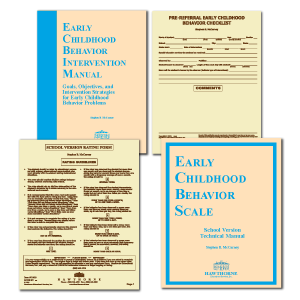|
Assessment and Intervention Resources |

 Be the first one to write a review
Be the first one to write a reviewby Stephen B. McCarney
© 1994
| Buy a complete kit and save $50! | |||
| 01450 | ECBS Complete Kit | $188.00 | Add to Cart |
| Complete Kit Includes: Pre-Referral Early Childhood Behavior Checklist (25), ECBS School Version Technical Manual, ECBS School Version Rating Form (25), Early Childhood Behavior Intervention Manual, and ECBS Quick Score (Download) | |||
| 01400 | ECBS School Version Technical Manual | $45.00 | Add to Cart |
| 01410 | ECBS School Version Rating Form (25) | $49.00 | Add to Cart |
| 01420 | Early Childhood Behavior Intervention Manual | $49.00 | Add to Cart |
| 01430 | Pre-Referral Early Childhood Behavior Checklist (25) | $45.00 | Add to Cart |
| 01401D | ECBS Quick Score (Windows®)-Download | $50.00 | Add to Cart |
Software that has been downloaded may not be returned.
The Early Childhood Behavior Scale (ECBS) was developed in response to frequent requests for evaluation/assessment and diagnostic input in early childhood behavior disorders. Based on the definition and criteria for emotional disturbance and behavioral disorders, the ECBS provides the standardized profile information and specific indicators necessary to determine which students are in need of intervention, behavioral support, and the opportunity to learn more appropriate behavior. Since early intervention has now gained universal support, the ECBS provides the necessary documentation and diagnostic information to begin a screening, intervention, and teaching program to improve the child’s chances of success.
The ECBS subscales, Academic Progress, Social Relationships, and Personal Adjustment were developed using behaviors appropriate for children ages 36 through 71 months in preschool and kindergarten settings. Results provided by primary observers such as teachers or mental health workers are used to document the behaviors which indicate areas of concern. Internal consistency, test-retest and inter-rater reliability; item and factor analysis; content, criterion-related, diagnostic, and construct validity are documented and reported for the scale.
Characteristics and Components of the ECBS
Educational Planning
The Early Childhood Behavior Intervention Manual (130 pages, © 1992) contains goals, objectives, and intervention strategies for the 53 behavior problems identified by the ECBS. The goals, objectives, and intervention strategies for the 53 behavior problems serve as an intervention guide for any teacher working with young students with behavior problems in special or regular education classrooms. The intervention strategies contained in the manual make it an extremely useful resource for the regular education teacher working with the mainstreamed behaviorally disordered student in the regular education classroom.
The Early Childhood Behavior Scale Quick Score computer program converts raw scores to standard scores and percentiles which makes scoring efficient and convenient.
SOFTWARE REQUIREMENTS